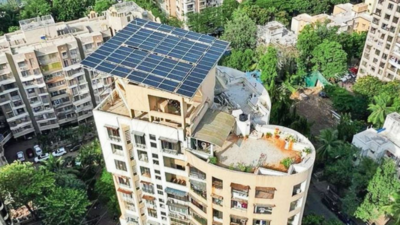- News
- City News
- mumbai News
- Kandivli building powers EVs with rooftop solar energy
Trending
Kandivli building powers EVs with rooftop solar energy

Vasant Aradhana Tower in Mahavir Nagar, Kandivli
MUMBAI: A housing society in Kandivli has harnessed electricity from rooftop solar panels and charged electric vehicles within the complex. The initiative illustrates the importance of carbon neutrality at a time when most electricity is derived from fossil fuels.

Since 2017, when solar rooftop panels were installed to generate 32 kWp of peak load electricity, the society has been utilizing clean energy to charge electric cars without encountering any issues. Hitesh Vakil, a managing committee member and resident of Vasant Aradhana Tower in Mahavir Nagar, Kandivli, expressed his satisfaction with the society's green initiative.
The 25-year-old, 15-storey building features a solar rooftop on its terrace, which adequately fulfils common requirements such as society compound lighting, water pumps, and lifts. The generated energy yields substantial savings and serves as a testament to the society's commitment to environmental conservation. Each year, the committee's annual report cites significant carbon savings equivalent to planting 120 trees. Moreover, the surplus solar power generated is channeled back into the grid, earning the society carbon credits and financial compensation through net metering. The managing committee opted to utilize the excess energy by establishing an EV charging station with the help of Adani Electricity.
An official from Adani Electricity said," Presently two electric cars are charged during late evening or nights and return for a recharge every four to five days. With this rotation system in place, the EV charging station has potential to accommodate more electric vehicles in future'."
Environmentalist Bhagwan Kesbhat emphasizes the need to move away from relying on energy derived from fossil fuel power plants to charge electric vehicles in India. Instead, he advocates for a cleaner environment and sustainable practices.

Since 2017, when solar rooftop panels were installed to generate 32 kWp of peak load electricity, the society has been utilizing clean energy to charge electric cars without encountering any issues. Hitesh Vakil, a managing committee member and resident of Vasant Aradhana Tower in Mahavir Nagar, Kandivli, expressed his satisfaction with the society's green initiative.
TimesView
Several European countries have been making the transition from thermal power stations to renewable energy sources. India, too, is committed to achieving its renewable energy targets. But it is crucial to ensure that only clean energy sources, such as solar power, are utilized to power electric buses, scooters, and cars. Power companies should take proactive measures to encourage buildings with solar installations to utilize any excess power generation for electric vehicle (EV) charging. This approach would guarantee that EVs operate on 100% clean fuel, aligning with India's commitment to sustainable transportation.
Vakil, who owns an electric SUV, takes advantage of the EV charging point in the building compound. "There are significant cost savings compared to public charging points found at malls or petrol stations," he said. Charging his vehicle within the society only costs around Rs 600 for a full charge, as opposed to the Rs 1,050 he would have to pay elsewhere. Furthermore, this power is not derived from polluting thermal power plants but instead utilizes a green and renewable energy source.
The 25-year-old, 15-storey building features a solar rooftop on its terrace, which adequately fulfils common requirements such as society compound lighting, water pumps, and lifts. The generated energy yields substantial savings and serves as a testament to the society's commitment to environmental conservation. Each year, the committee's annual report cites significant carbon savings equivalent to planting 120 trees. Moreover, the surplus solar power generated is channeled back into the grid, earning the society carbon credits and financial compensation through net metering. The managing committee opted to utilize the excess energy by establishing an EV charging station with the help of Adani Electricity.
An official from Adani Electricity said," Presently two electric cars are charged during late evening or nights and return for a recharge every four to five days. With this rotation system in place, the EV charging station has potential to accommodate more electric vehicles in future'."
Environmentalist Bhagwan Kesbhat emphasizes the need to move away from relying on energy derived from fossil fuel power plants to charge electric vehicles in India. Instead, he advocates for a cleaner environment and sustainable practices.

About the Author
Somit SenSomit Sen, Editor-Transport, Energy at The Times of India, Mumbai. He covers stories on Power beat in Maharashtra and on Oil & Gas. He also covers RTO, transport ministry, Maharashtra State Road Transport Corporation, interstate transport (trucks/tempos) and the fleetcabs.
Start a Conversation
FOLLOW US ON SOCIAL MEDIA
FacebookTwitterInstagramKOO APPYOUTUBE










